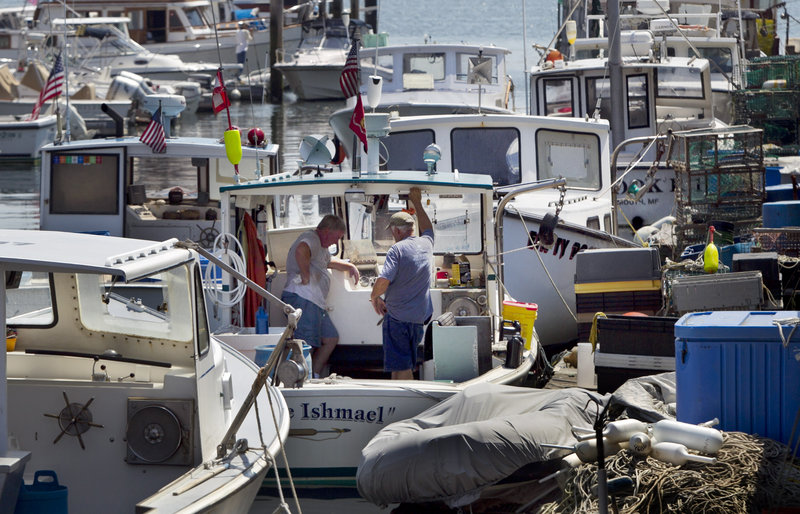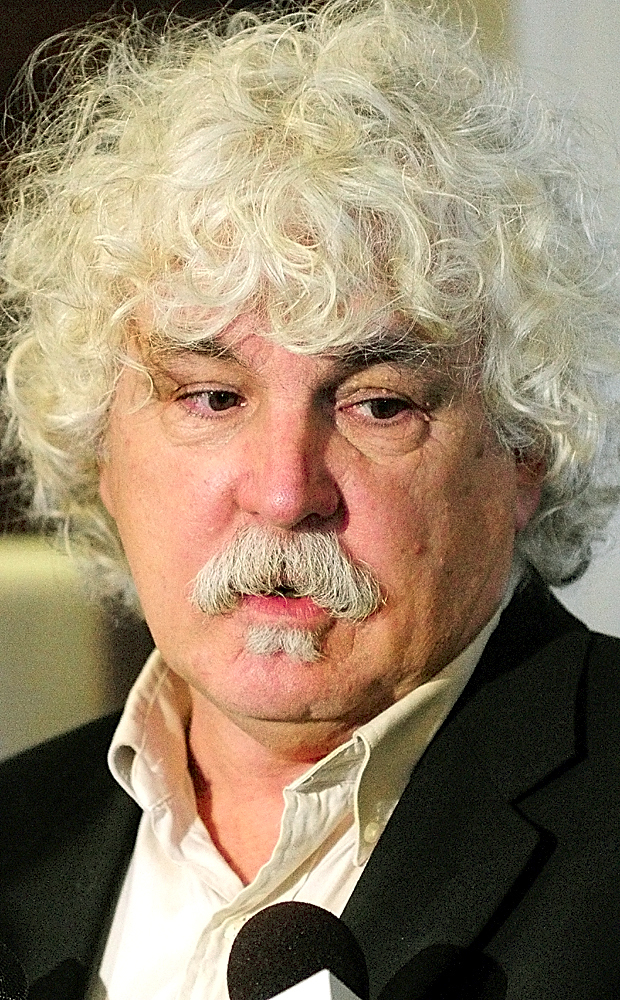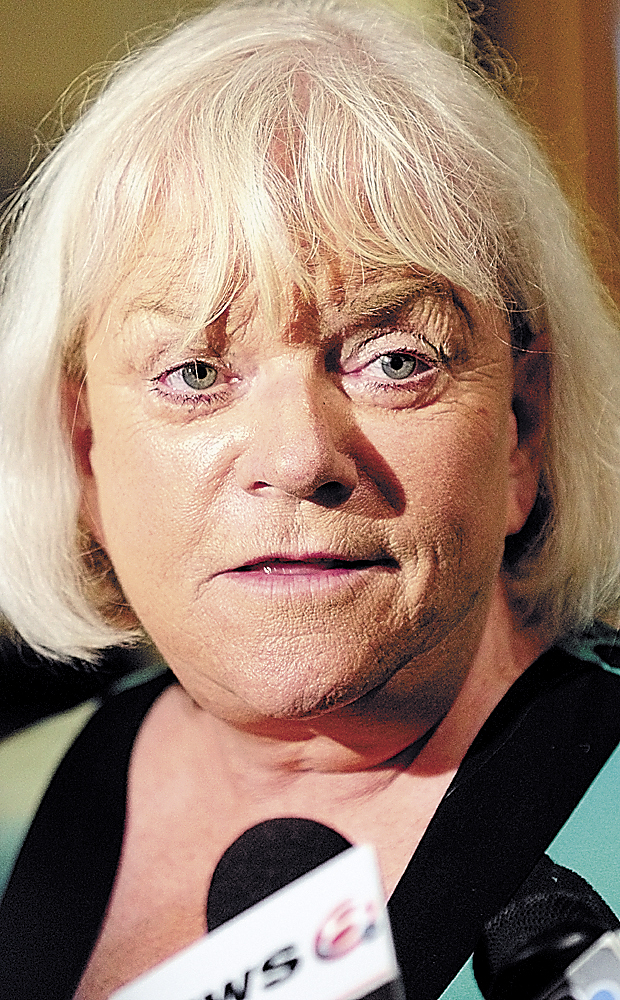FREDERICTON, New Brunswick – Maine lobster flowed back into Canada on Friday, one day after a judge ordered protesters to stop blocking access to processing facilities.
A handful of processors in eastern New Brunswick confirmed that they had reopened and were accepting lobster from Maine.
Meanwhile, some of the Canadian lobstermen who have protested the low price they are being offered for their catch met Friday with New Brunswick Premier David Alward. A spokeswoman for Alward said they discussed industry-led resolutions and strategies aimed at preventing similar disputes in the future, but she declined to release further details.
In Maine, Gov. Paul LePage’s administration met Friday with two of Maine’s biggest lobster processors to discuss long-term solutions to the oversupply. An administration official described it as a “fact-finding mission.”
Thursday’s court action in Canada — which set restrictions on demonstrations at New Brunswick’s processing plants for 10 days — was good news for the Maine lobster industry, which has been reeling all season because of a glut of soft-shell lobsters. Prices that lobstermen receive have fallen to 30-year lows of $2 to $2.50 a pound.
More than half of all lobsters caught in Maine goes to Canada for processing, and bordering New Brunswick has the most processors by far.
The problem in Canada is complex. It has divided fishermen and processors, who have always had a give-and-take relationship, and it also has caused tension among the fishermen themselves.
Jeff Parsons, who is on the executive board of the Maritime Fisheries Union, said the protests have been orchestrated by a small but vocal group of frustrated lobstermen in southeastern New Brunswick.
“I’m a reasonable guy, and I want to work on a solution,” he said. “For some guys, though, they see only what they want to see.”
Over the last couple of days, as New Brunswick’s processors have been idle, there has been unease about whether the protests will strain the relationship between Maine and Canada when it comes to lobster.
Alward stressed that Maine is an integral partner in the lobster industry, but LePage and others have begun talking about increasing processing capacity in Maine.
Before that happens, the administration said, the state must boost demand for Maine lobsters.
Patrick Keliher, commissioner of the Department of Marine Resources, said after Friday’s meeting with processors that promoting the Maine lobster brand is necessary if processing plants are going to be financially viable in this state.
“I want to stress that this is just the beginning of a fact-finding mission,” said Keliher, who hinted that policy changes may be coming to help increase demand.
Linda Bean, part of the L.L. Bean family and a LePage supporter, met with the governor, along with John Hathaway, owner of Shucks Maine Lobster in Richmond.
Bean said the state should invest in marketing and work harder to make sure customers can tell the difference between Maine lobsters and those from elsewhere. She said certification would boost demand for Maine lobsters in other regions.
Bean also floated the idea of adding a tax on Canadian lobsters, which she said can be sold for less because the Canadian industry receives government subsidies. That idea appears to face long odds, given that the North American Free Trade Agreement says Canadian products are duty-free.
Still, Bean expressed hope that Maine’s congressional delegation will consider advancing the idea.
“I’m not a protectionist, but we need protection or else we won’t be able to sell in volume,” she said.
Hathaway told The Associated Press that Maine processors need more marketing to draw more customers.
It makes no sense, he said, for Maine’s lobster industry to send tens of millions of pounds of lobsters to Canada each year and have Canadian companies create products that are sold back in the United States.
“That’s what I would call a foolish business model,” Hathaway said. “What we need to do is add value and jobs here.”
LePage declined to speak to reporters after the meeting. But in his weekly radio address Saturday, he will say the Canadian situation “is all about money.”
The governor, who on Friday lifted the customary embargo on his weekly address, plans to highlight Maine’s dependence on Canadian processors, which take as much as 70 percent of the state’s catch.
“Processors are paying only a fraction of the true cost due to the abundance of lobster and lack of processing capacity here in Maine,” the address reads.
The state has three major processors. LePage says there aren’t more because of the state’s “high cost of doing business,” caused by its high energy prices and environmental regulations.
“Getting our lobsters delivered and processed in Canada helps in the short-term, but Maine needs a permanent solution,” the address says.
“We need more processing capacity. After all, the Maine lobster is world renown. We must be in a position to add value to our product instead of Canada gaining all the added value.”
Keliher reported that the 10-day injunction on protests in Canada appeared to be working. He said he hopes tension will subside as New Brunswick fishermen resume fishing next week.
Keliher said the injunction came just in time. Another two days, he said, and the Maine catch could have been sitting on docks to rot.
The Associated Press contributed to this report.
Staff Writer Eric Russell can be contacted at 791- 6344 or at:
erussell@mainetoday.com
Staff Writer Steve Mistler can be contacted at 791- 6345 or at:
smistler@mainetoday.com
Copy the Story Link
Send questions/comments to the editors.







Success. Please wait for the page to reload. If the page does not reload within 5 seconds, please refresh the page.
Enter your email and password to access comments.
Hi, to comment on stories you must . This profile is in addition to your subscription and website login.
Already have a commenting profile? .
Invalid username/password.
Please check your email to confirm and complete your registration.
Only subscribers are eligible to post comments. Please subscribe or login first for digital access. Here’s why.
Use the form below to reset your password. When you've submitted your account email, we will send an email with a reset code.